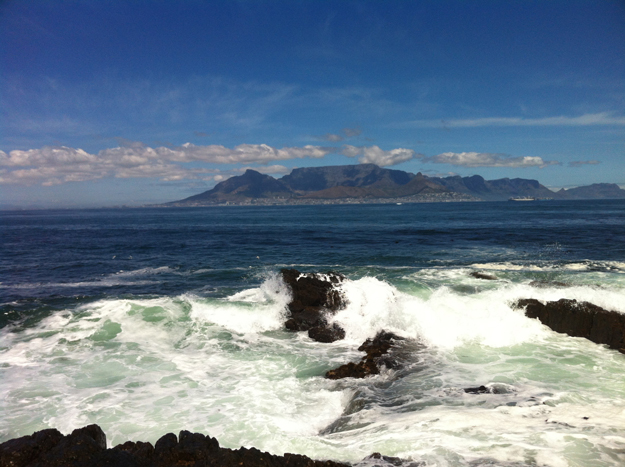A Season to Braai
A holiday in South Africa

WILMA correspondent and longtime Wilmington resident Allison Ballard relocated to South Africa this year after the Wilmington West Rotary Club sponsored her for a study abroad. She is writing, taking classes, and volunteering during the yearlong program.
After asking around about what to expect for my upcoming holiday season in South Africa, I wasn’t surprised by the answer: “We braai.”
December is summer in Cape Town, when the rains of winter and a windy spring fade into warm and pleasant weather. And South Africans do take their grilling seriously. Early conversations with my hosts veered to country-by-country grilling reputations, about how the U.S. compared to Australia and what would be my home country for the year. Here, as elsewhere, there are competitions, reality shows, and holidays devoted to the braai.
One of South Africa’s favorite celebrity chefs goes by the name Jan Braai, and he is behind a national campaign to turn a public holiday into National Braai Day. For the most part, he’s succeeded. Heritage Day, which takes place in September, began in 1996 as a post-apartheid effort by Nelson Mandela to help the country celebrate its diversity and tradition.
There has been some backlash (Heritage Day should be spent doing something more profound and serious, according to critics), but the braai concept has taken hold – perhaps because it is such a cross-cultural phenomenon, which is saying something in a country with eleven official languages.
Braai comes from the Afrikaans braaivleis (or “grilled meat,” natch). But other communities call it ukoja (in Xhosa) or shisa nyama (in Zulu.) Cooking meat over fire is a simple pleasure that can be enjoyed no matter your race, culture, or socioeconomic background. Even Desmond Tutu has given his endorsement to the braaiing.
Soon after I arrived in Cape Town, to spend a year as a Rotary Ambassadorial Scholar at the University of Cape Town, I was at a braai. The first was a simple family get-together with my host counselor. At the second, I noted that South Africans really, really liked sausages. I’ve learned a bit more about the practice since then.
Gas braais, while acceptable, are generally frowned upon. Using a fire powered by wood, charcoal, or maize husks is preferred. They like using Weber grills here, although they pronounce them Wee-bers.

Sausages of many sorts are commonly found in butcher shops and grocery stores, and on hot metal grates. A coil of boerewors, or “farmer’s sausage,” smoking on the grill is a frequent sight. But you’ll also find meat in a variety of forms from game (such as eland, kudu, or springbok) to the more familiar beef, chicken, or pork.
Sosaties are a Cape Town Malay dish of curried kabobs. Salads, coleslaws, and potato salads often go along with the meal. But there are a few unique regional dishes, as well.
Umngqusho, is a traditional Xhosa dish made with samp (stamped corn kernels), beans, onions, carrots, potatoes, and cheese that is supposed to be one of Mandela’s favorites.
Southerners might appreciate the concept of pap, or mealie meal, a thick grits-like porridge that serves as a base for the grilled meats, gravy, and sauce.
I have yet to experience a Christmas braai, but I’ve been told to expect some variation on the traditional turkey – maybe one wrapped in streaky bacon (as opposed to back bacon or shoulder bacon) or stuffed with (yes!) sausages.